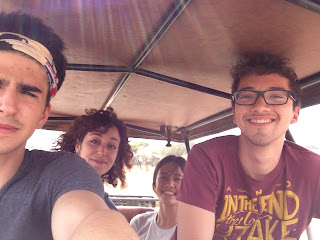Chapati – breakfast classic; a little bit more rough version of a Polish/French pancake (the thin one, not the Canadian fatass), tastes slightly different, probably because of the difference in ingredients; still, in my opinion, close enough to call it a pancake. Usually eaten by itself or with fruits (mostly bananas).
Wali nyama – probably the only distinctive, not fried and, by the way, my favourite food in Tanzania. Wali in swahili means rice, nyama – beef. The green thing is cooked spinach – quite bitter in taste, but goes well with the rest. Accompanied with cooked beans in a thick sauce.
Ugali – creature made of maiz flour. You take a little bit, throw it in the air (only after some practice), roll it into a ball, make a little whole with your finger and dip it in the nyama sauce. Usually as a replacement for rice.
Chips maiai – classic Tanzanian food. Maiai in swahili means eggs. It's an omelette with chips – inside the omelette. Served with salt, tomato sauce (which is just a watery version of ketchup) and occasionally sauerkraut. Eaten with hands or toothpicks.
Mishikaki – pre-fried beef skewers and then grilled.
Kuku – quarter of a chicken, deep fried and then grilled.
Samaki – a whole fish, i'll let you guess the way of preparing it. I didn't dare to try.
Ocassionally behind the glass you can also find beef samosas and 'kababs' – signs of Indian and Arabic influence back in the days. Very, very deep fried.
The impression that people coming from countries with more sophisticated food culture get is that EVERY SINGLE THING IS FRIED. It's difficult to explain why, living in such hot conditions all year around, Tanzanians chose to eat the heaviest food possible. The reason why I couldn't find an answer for a long time is that my assumption was wrong. It is not people who chose such cuisine. It is the poverty that did. Take a look at chips maiai – all you need is a few eggs and some potatoes. Surprisingly, people don't eat much vegetables or seafood here. Zanzibar, however, is different. Full of seafood. I guess it is more profitable for locals to sell seafood to tourists, rather than eating it themselves.
This place is definitely not a paradise for foodies. The variety is close to zero. It takes time, but you can really get used to eating the same thing almost every day. You just need to change your mindset – accept that food is a necessity, rather than pleasure. You eat, because you have to. You eat in order to survive, rather than enjoy it. Once you get past that issue, you'll be fine. And if you still miss variety, there are a few Indian and Chinese restaurants as well as 3 Subways and 1 KFC (no McDonald's though!). The prices in these places are usually twice or three times as high as in the local food places.




































